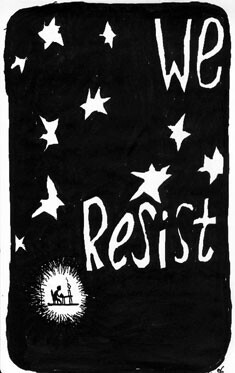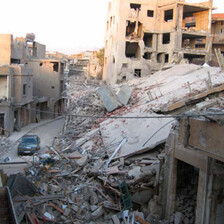Sunday Business Post 23 July 2006

“We resist” by Beirut artist and blogger Mazen Kerbaj. See more of his work.
This focus on the “latest incident” is designed to obscure what truly lies at the heart of this ongoing conflict: Israel’s violent takeover of Palestine.
Palestinians, expelled from their country in 1948, had continued their struggle against Israel from Lebanon. In 1982, Israel invaded that country in an attempt to destroy the Palestine Liberation Organisation, killing tens of thousands of civilians. On that occasion, Israel’s official pretext was a failed assassination attempt against its London ambassador.
Rather than ending resistance, Israel laid the seeds for what we see today.
The mostly Shia villagers in southern Lebanon who bore the brunt of Israel’s 1982 invasion are the core constituency of Hizbullah, founded in 1983 to resist Israel’s occupation.
The fighting in Lebanon, and to the south in Gaza, are directly related to Israel’s origins, and the regional violence will only spiral until there is a just solution to the Palestine question.
Israel was established in 1948 as an explicitly ”Jewish state” in a country whose overwhelming majority population at the time was not Jewish and had no desire to live under such a government. Such a project could only generate enormous resistance.
Because of this, Israel has never gained legitimacy among the people who paid the price for its creation.
Lacking such legitimacy, Israel exists only by the constant exercise of brute force - first to expel the majority of Palestinians, to prevent the return of refugees and, after 1967, to settle as many of its Jewish citizens as it could in east Jerusalem, the West Bank and Gaza Strip.
Zionist leaders hoped that the transformation of Palestine from a multicultural, multireligious society into one ruled exclusively by and for Jews would have been completed by now, with the Palestinians merely a distant memory.
Instead, Israel created a catastrophe.
Today because of their determination not to be driven from what remains of their land, and due to their higher birth rate, Palestinians are once again becoming the majority population. Their struggle draws support across the Arab world, including from groups like Hizbullah.
For the first time since the 1948 expulsions accompanying Israel’s foundation, Jews no longer form the absolute majority in the territory they control.
Israeli and Palestinian official statistics count 5.3 million Jews living in Israel-Palestine and 5.6 million non-Jews (this does not include millions more Palestinian refugees outside the country).
Israeli leaders understand what this means. Prime minister Ehud Olmert said in 2003: “We are approaching the point where more and more Palestinians will say ‘There is no place for two states between the [River] Jordan and the [Mediterranean] sea. All we want is the right to vote’. The day they get it, we [Israeli Jews] will lose everything.”
Olmert added: “I shudder to think that liberal Jewish organisations that shouldered the burden of struggle against apartheid in South Africa will lead the struggle against us.”
The internationally-endorsed solution for the dilemma is a complete Israeli withdrawal from the territories occupied in 1967 so that Palestinians can establish a state in these areas, which amount to just 22 per cent of their original homeland.
Unfortunately, Israel used the years of the peace process, not to begin to end its occupation, but to entrench it - doubling the number of settlers in the West Bank. While it pulled 8,000 settlers out of Gaza last year, former Israeli prime minister Shimon Peres explained on the BBC in August:’ ‘We are disengaging from Gaza because of demography.”
Israel hoped that, distracted by the pulling out of a few settlers, the world would not notice its continued military control of Gaza, as well as its annexation wall and the massive expansion of Jews-only colonies throughout the West Bank.
Israel’s full-scale assault on Lebanon and its round-the-clock bombardment of Gaza have nothing to do with the recent attacks on its army.
The indiscriminate killing of civilians can only be understood as an attempt to put fear back into the Arabs, in a desperate effort to maintain Israel as a Jewish-dominated garrison state surrounded by concrete walls.
But groups like Hizbullah and Hamas, which emerged as a direct response to the brutality of decades of Israeli occupation, and an absence of principled international intervention, represent a generation no longer cowed by Israel’s US-supplied missiles and jets.
FW de Klerk, the last president of apartheid-era South Africa, calculated when he took office that the white government could retain power for many years, but only at the cost of inflicting enormous casualties.
Both he and Nelson Mandela concluded that nothing could be gained from further bloodshed and that the time had come to negotiate the peaceful end of apartheid.
Looking back on the apartheid regime’s long history of violence, de Klerk wrote in his memoirs: “There is no evidence that the assassination of opponents had the slightest effect on the final outcome of the struggle, other than causing further personal suffering and bitterness.”
It is only by ending their claims of superior rights and power that Israeli Jews, like white South Africans, will gain the legitimacy and acceptance from people in Lebanon, Palestine and across the Middle East that cannot be won with violence.
Ali Abunimah is co-founder of The Electronic Intifada, and author of the forthcoming book One Country: A Bold Proposal to End the Israeli-Palestinian Impasse. This article first appeared in Ireland’s Sunday Business Post on 23 July 2006.
Related Links





